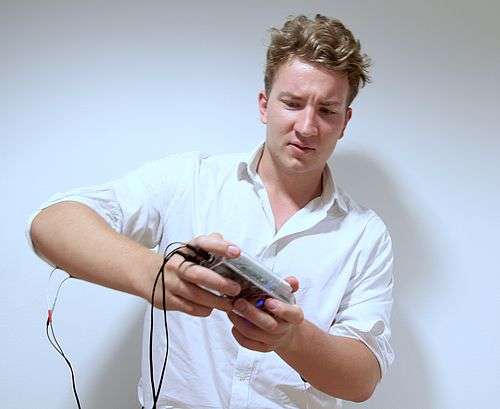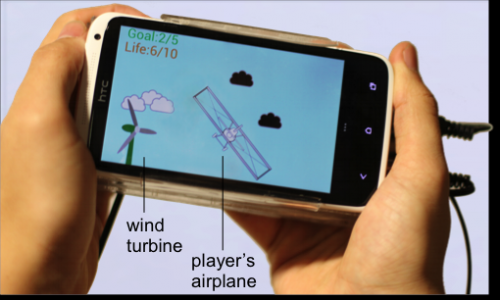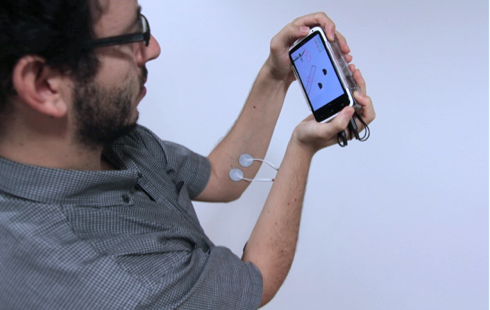February 4, 2013 report
Force-feedback for smartphones tilts game-playing field (w/ video)

(Medical Xpress)—A team from the Hasso Plattner Institute in Germany is doing work in force-feedback technology targeted for mobile devices such as smartphones. Their work is an easy fit into the lives of smartphone gamers. No motors here. Their work is presenting a new day for gamers, in that there are no motors, no roadblocks to miniaturization as add ons for smartphones or other mobile devices, and no risk of draining a battery quickly as their device uses less power than vibrating motors.
"Force feedback devices resist miniaturization, because they require physical motors and mechanics," they said. "We propose mobile force feedback by eliminating motors and instead actuating the user's muscles using electrical stimulation," according to the researchers on their Hasso Plattner page.

They call this system muscle propelled force feedback. This involves electrical muscle stimulation (EMS) to mimic signals that are sent by the central nervous system to activate muscle groups. EMS technology is often used as a rehabilitation tool designed to help patients recover from varying levels of paralysis. The researchers said their prototype fits on the back of a mobile phone and that it actuates users' forearm muscles via electrodes.
While playing a game on a smartphone, jolts could go straight into the user's hand muscles. Small wired electrodes attached to the forearm would make the hand muscles contract, The user then fights that contraction using another muscle to oppose it, so the sensation is as if one needs to fight a force.
"Our prototype electrically stimulates the user's arm muscles via the shown electrodes, causing the user to involuntarily tilt the device. As he is countering this force, he perceives force feedback," according to the team.

Stimulating muscle tissue in the user's arm through the electrodes triggers an involuntary contraction, which forces the user's arms to tilt sideways along with the device. The researchers leveraged the actions to create a scenario in a video game where the players are managing airplane movements.
In an airplane videogame, involuntary tilting represents winds that threaten to derail the plane. Players try to stay on course. In one illustration, the researchers show how muscle-propelled force feedback causes the user's wrist to tilt the device. The user responds by countering the forces to steer the plane against the wind.
More information: www.hpi.uni-potsdam.de/baudisc … _force_feedback.html
© 2013 Phys.org



















